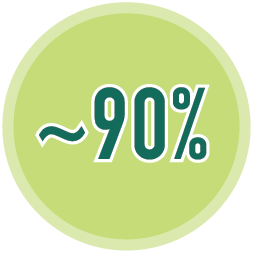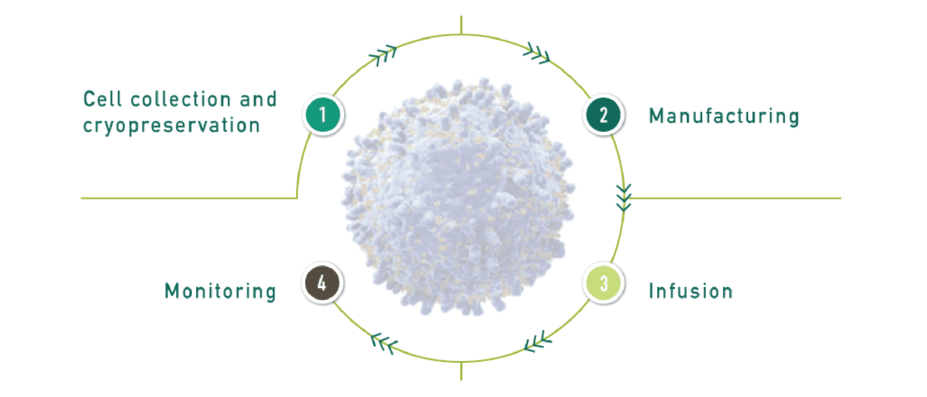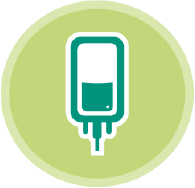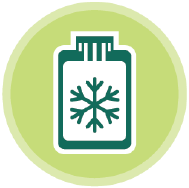Treatment Process
About CAR-T Cell Therapy
CAR-T cell therapy is a targeted, personalized therapy that contains patients’ autologous T cells reengineered to fight cancer. KYMRIAH® (tisagenlecleucel) is a CAR-T cell therapy genetically modified to identify and eliminate CD19-expressing malignant and normal cells. Upon binding to CD19-expressing cells, the CAR transmits a signal to promote T-cell expansion, activation, target cell elimination, and persistence of the KYMRIAH cells.1
Prior to CAR-T cell therapy, patients with r/r DLBCL had limited treatment options and substantially reduced survival. Planning ahead and identifying the right patient for KYMRIAH is critical in optimizing CAR-T treatment outcomes.
Nearly 90% of patients with r/r DLBCL do not achieve long-term remission when treated with traditional therapies and autologous transplant2 |
Patient Identification
KYMRIAH is a CD19-directed genetically modified autologous T cell immunotherapy indicated for the treatment of adult patients with relapsed or refractory (r/r) large B-cell lymphoma after two or more lines of systemic therapy including diffuse large B-cell lymphoma (DLBCL) not otherwise specified, high-grade B-cell lymphoma, and DLBCL arising from follicular lymphoma.1
Limitation of Use: KYMRIAH is not indicated for treatment of patients with primary central nervous system lymphoma.1
KYMRIAH can be considered for adults with r/r DLBCL who have received 2 or more systemic therapies with any of the following clinical characteristics3:
Have not gone into remission (refractory after second line of therapy)
Have relapsed (after second line of chemotherapy)
Have relapsed following autologous stem cell transplant (ASCT)
Have challenges with stem cell collection after salvage chemotherapy
Are ineligible or not a candidate for ASCT owing to inability to achieve complete remission (CR) or are unlikely to achieve CR after salvage therapy
MORE THAN 5000 CLINICAL AND COMMERCIAL PATIENTS HAVE RECEIVED KYMRIAH4
Contact a treatment center early if considering KYMRIAH for a patient. Communication between the primary physician and the treatment center is integral to the treatment process. Find a KYMRIAH Treatment Center
Steps for Patients to Receive KYMRIAH
Cell Collection and Cryopreservation The patient’s T cells are collected from the blood (leukapheresis). The material is cryopreserved, allowing leukapheresis to be scheduled at a time that is in the best interest of the patient.1,a | |
Manufacturing The patient’s cryopreserved cells are shipped to a Novartis FDA-registered and -approved manufacturing facility, where they are genetically reprogrammed into KYMRIAH CAR-T cells.1 | |
Infusion The patient may receive lymphodepleting chemotherapy to prepare the body for KYMRIAH.1 KYMRIAH is administered in either an inpatient or outpatient hospital setting at the treating physician’s discretion.5 | |
Monitoring The patient should stay within proximity of their KYMRIAH Treatment Center for at least 4 weeks after KYMRIAH infusion.1 Patients should be encouraged to participate in a 15-year long-term follow-up registry. |
aLeukapheresis material from a previous collection may be used if it was collected within 30 months at a Novartis-approved apheresis collection facility.6
The KYMRIAH CAR-T Cell Therapy Manufacturing Process
The KYMRIAH manufacturing process utilizes cryopreservation, which allows for:
Flexibility for patient scheduling6 You can schedule collections as soon as a patient is identified | |
Optimal timing for leukapheresis6 Leukapheresis material collected at a Novartis-approved apheresis collection facility can be cryopreserved for up to 30 months before manufacturing begins, if you decide that is the best treatment course for your patient.b KYMRIAH is the only commercially available CAR-T cell therapy that allows for early leukapheresis and extended storage of cryopreserved leukapheresis material | |
Shipping7 The charged Dewar is validated to maintain cryogenic temperatures for 10 days, keeping the cryopreserved leukapheresis material frozen, and providing a safeguard against weather- and/or logistic-related delays | |
Storage of excess cells6 It may be possible for excess cells to be retained at your facility for potential future use, if a collection yields greater than 4 x 109 CD3+ cells and subject to certain storage requirements |
bKYMRIAH is individually manufactured for each patient; it is important to keep in mind that not all patients’ cells can be successfully manufactured into KYMRIAH CAR-T cells.









